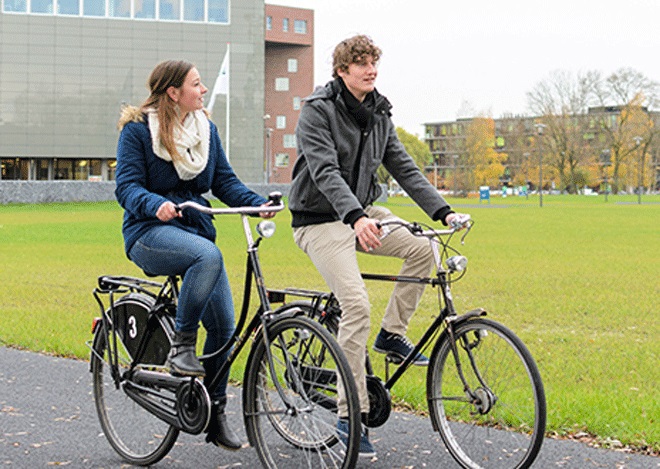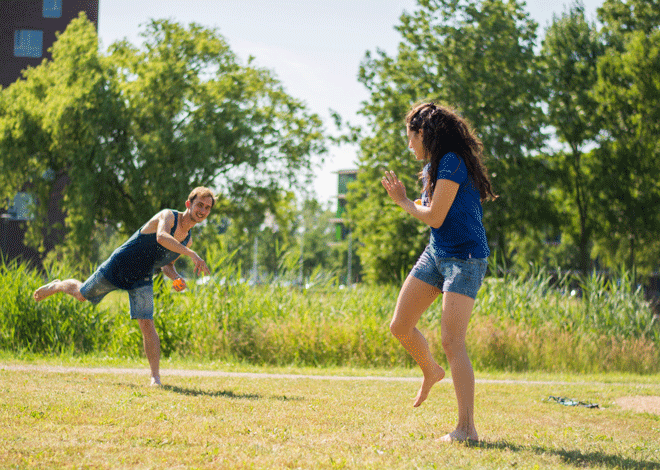Putting things into perspective is the best way of dealing with stress
It is understandable why study stress is such a hot topic in the news. Louise Fresco has written an article about it in NRC Handelsblad (Dutch quality newspaper). Specifically aimed at first-year students, she writes: ‘Putting things into perspective is the best way of dealing with stress‘.

For students and parents
The article about study stress is written for students. But of course this does not mean that this article isn’t also worth reading as a parent. Want to react to the article? I’ll make sure your comments find their way to Louise Fresco …

Louise O. Fresco, President of the Executive Board of Wageningen U&R and writer.
Putting things into perspective is the best way of dealing with stress
Dear first-year students,
You’ve just started the new academic year. No doubt you’ve been told that during this period you will have the most freedom you will ever have in your life, you will make friends for life, will often find a partner and hopefully a job too. You’ve also heard, because the Minister of Education warned about it, that first-year students experience a lot of stress because of all the changes they undergo at this time. Well, apart from illness, shortage of accommodation and loneliness… a dose of stress is also one of the things you will have to learn to channel. Don’t combat stress with drink, sports, herbal tea or scented candles, but put things into perspective. Putting things into perspective is the best way of dealing with stress. A quick guide:
Don’t worry too much about the specific programme you have chosen
- Don’t worry too much about the specific programme you have chosen. The exact subject you study is important only if you have chosen it with a lot of conviction and have always wanted to become a doctor or architect. Most students aren’t as committed as this, and that’s fine. In those cases, the subject of study is not as important as the way in which you study. Society is changing fast and it’s hard to predict what knowledge you’ll need during the course of your life. This is where skills like the ability to write, present, think logically and work with figures form the basis for a wide range of applications. How you study has a lot to do with concentration. Reading and thinking for two hours without taking a look on social media or making a coffee is a minimum.
Finding it difficult to concentrate?
- Don’t get depressed if you can’t concentrate continuously. No-one can. Get new ideas by lateral thinking, look – as it were- out of the corner of your eye or make cross-connections. Take a walk round the block, start another chapter, but don’t give up, stay alert. If it really isn’t working for you, use the zoom-in-zoom-out-method: alternate your attention to details and the short term with a closer attention to the bigger perspective.
Worried about the job market?
- Don’t worry now whether you’ll be worth something on the job market later. Concentrate on academic skills, rather than on a profession. Even if a subject such as Literary sciences does not seem to have much immediate practical use, you learn how to analyse inconsistencies, understand the motives of characters and report on them. For example, if you can work your way through Tacitus, year reports might just be a piece of cake for you. If you can demonstrate these abilities, you will be successful in future interviews.
Multi-disciplinary
- Exact studies are held in high regard, but don’t despair if you aren’t a real nerd. The stereotypical division into alpha, beta and gamma has less and less relevance. If you are someone who is really into figures and hard causality, go for it. And if you get excited by an orchid in a place where orchids have never been seen before, your perspective is equally valuable. Beta students can always use a touch of alpha and gamma, and vice versa. Refrigerators aren’t designed in isolation, but together with users. Even particle accelerators don’t warrant their existence without support from society. Conversely, the basic concepts of physics, chemistry, mathematics and biology are vital society at large. Many politicians still don’t know the exact difference between a billion and a trillion.
Get to know yourself from a different perspective
- Get to know yourself from a different perspective. Do something different, not just what you like doing. Talk to fellow students from a different background, about subjects outside your normal field of interest. Go birdwatching – especially if you can’t tell the difference between a blackbird and a starling, take a cookery class if you can’t boil an egg. Think of it as an investment in your ability to get to know yourself and to continue learning. You will benefit from this long after your study. Putting things into perspective is the best way of dealing with stress.
Louise O. Fresco is President of the Executive Board of Wageningen U&R and writer.

Doing sporting activities on Campus and relaxation is very important. It will help you put things that you sometimes find difficult into perspective.
Putting things into perspective is the best way of dealing with stress
Want to react to Louise Fresco’s article ‘Putting things into perspective is the best way of dealing with stress?’ I’ll make sure she reads your comments.

